Suchergebnisse für "Factsheet: Energietechnologien gestalten, die für alle sinnvoll und nutzbar sind"
Energy R&D 2021: Public Expenditures in Austria
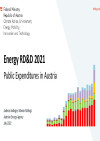
The public energy research expenditures amounted to 224.1 million euros in 2021, thanks to the economic stimulus plan. This is the highest value so far and an increase of 44.4%.
Schriftenreihe
22/2022
A. Indinger, M. Rollings
Herausgeber: BMK
Englisch, 123 Seiten
Downloads zur Publikation
Energy R&D 2022: Public Expenditures in Austria

The public energy research expenditures amounted to 214.4 million euros in 2022, which is 9.6 million euros less than in the previous year.
Schriftenreihe
40/2022
A. Indinger, F. Bettin, M. Rollings
Herausgeber: BMK
Englisch
Downloads zur Publikation
City Cooling - Intelligent district cooling implementation, Vienna
Development of an intelligent district cooling concept and alternative solutions for heat rejection from central absorption chillers at the example of the neighbourhood TownTown in Vienna.
Environmental Label PLUS / Umweltzeichen PLUS (UZ+): Extension of the Austrian Environmental Label towards Sustainability
Aspects of sustainable beyond pure ecological goals become increasingly important for consumers, corporations and the general public. The well-known Austrian Environmental Label should be extended to meet these comprehensive requirements.
Efficient use of biogenic resources
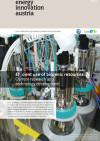
Current research and technology development
energy innovation austria
3/2017
Herausgeber: BMVIT und Klima- und Energiefonds
Englisch, 8 Seiten
Downloads zur Publikation
South Burgenland Innovation Cluster
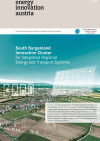
South Burgenland Innovation Cluster for Integrated Regional Energy and Transport Systems
energy innovation austria
1/2019
Herausgeber: BMVIT und Klima- und Energiefonds
Mehrsprachig, 8 Seiten
Downloads zur Publikation
FiTNeS - Facade integrated modular Split-heat pump for new buildings and refurbishment
The goal of FitNeS was the development of modular split heat pumps with compact and silent façade-integrated outdoor units for heating and domestic hot water preparation (and optionally cooling in combination with PV). The outstanding features of the concept are a modular design with a high degree of prefabrication and representing a visually and architectonically attractive, economic and sustainable solution for both new constructions and renovations. One of the main development goals is the minimization of sound emissions by means of optimized flow control.
Acceptance and improvement of low-energy-house components as a mutual learning process for users and producers

A social scientific investigation of acceptance and dissemination strategies for controlled ventilation systems with waste heat recovery and a joint heating system in low energy and passive houses.
Innovations for cool urban oases
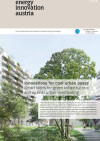
Smart ideas for green infrastructure and against urban overheating
energy innovation austria
3/2018
Herausgeber: BMVIT und Klima- und Energiefonds
Englisch, 8 Seiten
Downloads zur Publikation
Digitization in the construction industry
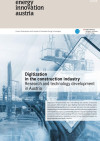
Research and technology development in Austria
energy innovation austria
4/2018
Herausgeber: BMVIT und Klima- und Energiefonds
Englisch, 8 Seiten
Downloads zur Publikation
University Plus-Energy Office High-Rise Building
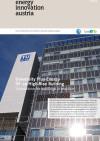
Innovations for buildings in practice
Herausgeber: BMVIT und Klima- und Energiefonds
Englisch, 8 Seiten
Downloads zur Publikation
CoolAIR - Predictive control of natural nighttime ventilation and daylight-optimized shading for passive building cooling
Natural nighttime ventilation and daylight-optimized shadowing are high potential approaches to efficiently and economical cool buildings. Nevertheless, the full potential cannot be acquired, since, if at all, such behavior is manually initiated by users. Goal of this project is the development of an automated, self-learning system that can assess the full cooling capabilities and establish an alternative to conventional air conditioning systems.
Oekosan 09 - International symposium for high-quality energetic renovation of large-scale buildings
From October 7 to 9, 2009 the AEE INTEC has organized an international symposium "Ökosan 09". The emphasis of the symposium was the communication of (partial) results of running and closed cooperation projects by leading technical experts dealing with the retrofit of large-scale buildings.
Connection of innovative strategies and technologies to a holistic, resources-friendly plus energy building (FUTUREbase)
On the basis of a construction project in Giefinggasse 4 in Vienna the combination of new, innovative strategies and technologies to an integrated, resources conserving plus energy building with high signaling and multiplication effect had been tested for feasibility. A regional, energetical bond between the buildings TECHbase, ENERGYbase and the Klima-Windkanal had been developed.
Elaboration of the conditions to build up a reuse-cycle network for WEEE
Selection of electrical and electronic equipment disposed as waste back into a reuse-cycle, bulding up an operational network between social enterprises, linking up and improving the workflows necessary for this purpose and the creation of a second-hand-shop for electrical an electronic equipment.
EnergieAudioAkademie - Development and usage of audiofiles for the training of professionals from the building sector
Important issues in building energy efficiency will be prepared as audio files. The target groups are builders and plumbers. The files complement existing training and educational programs and will be disseminated via CDs and/or USB sticks to the target groups via craftsmen networks and an internet platform.
Evaluation of temperature differentiation on a room-by-room basis in passive house apartments
In the passive house Utendorfgasse a room–by-room temperature control was installed in 11 apartments. The experiences were evaluated from a technological and from a sociological point of view.
Investigation of Industrial Processes (IEA- Solar Heating and Cooling Program, Task 33)
The central aim of this international research cooperation is to make industrial processes accessible for solar thermal plants. To achieve this aim basic information is elaborated and components as well as system engineering concepts are developed. Furthermore the intention of Task 33/IV is to survey a detail state of the art in the field of solar process heat that has a validity for Europe. The work of JOANNEUM RESEARCH - Institute of Sustainable Techniques and Systems focuses mainly on the contents of Subtask B.
PassiveHouseDataBase - International Passive House and Passive House Plus Database
About 3.000 buildings are documented, all of them show a high level of comfort and follow energy and building technique standards for passive houses and plus-passive houses. By integration of object and evaluation data, the database will become the worldwide basis for extremely energy efficient buildings and because of its multilingualism and quality assurance opens up new sustainable export possibilities.
KlimaStadtLinz2030: Linz and its path to climate neutrality by 2030 - Preparation for the EU - Mission “100 Climate-neutral Cities by 2030”
The research project investigates whether and how it is possible for the city of Linz to achieve climate neutrality by 2030 within its own sphere of influence. A common vision, which is being developed with the citizens in a participatory manner, unites the opportunities that arise for the city through the measures necessary for this goal.
